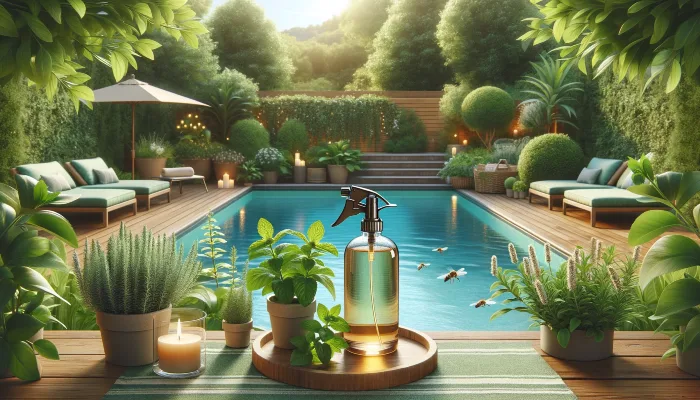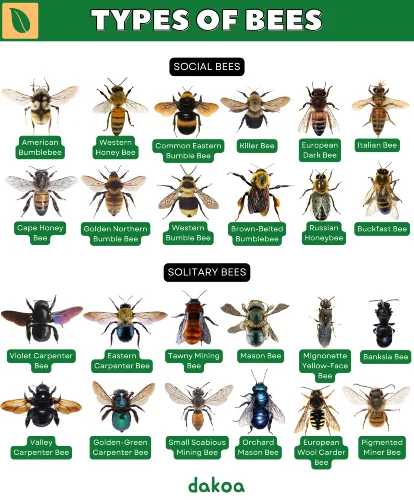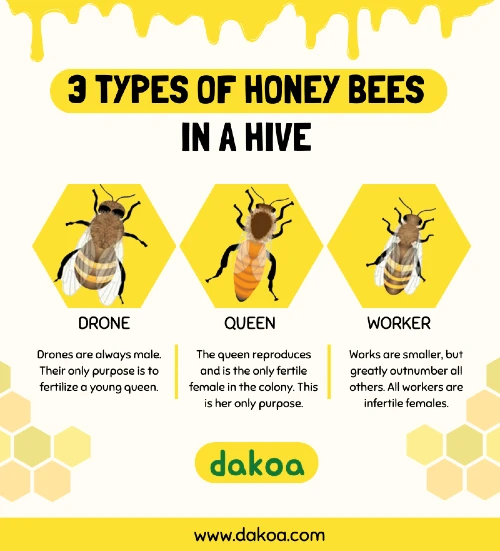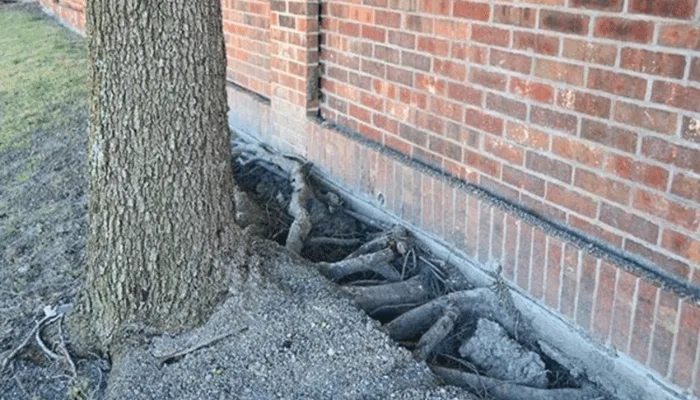Bees are incredibly important pollinators, playing a vital role in our ecosystem. However, sometimes honey bees, bumble bees, carpenter bees, and even yellow jackets can become a nuisance – particularly when bee stings are a danger or when they are attracted to your outdoor space.
If you’re looking for natural bee repellents to enjoy your outdoor activities in peace, this article has you covered. We’ll explore natural ways to keep unwanted bees away from your new home, swimming pool, and surrounding area.
Understanding Bees and Their Attraction
Bees are naturally drawn to areas where their basic needs can be met: food, water, and shelter. Sweet smells from sugary nectar, fruit juice, or even your swimming pool water can attract bees.
Understanding these attractions is the first step in keeping bees away from your personal space, especially for those with a bee allergy who must take extra precautions.
Bees, especially species like honey bees and bumble bees, possess an incredible sense of smell, guiding them to these sources of sustenance. Recognizing what attracts bees is the cornerstone of deterring them. It’s not just about avoiding inconvenience; for individuals with bee allergies, it’s a matter of health and safety.
Where Do My Backyard Bees Live?
Why Are Bees Attracted to Homes and Pools?
Before we dive into repellents, let’s understand what attracts bees:
- Sources of water: Especially in warmer months, bees need water like pool water, bird baths, or even leaky faucets.
- Sweet smells: Sugary nectar, fruit trees, open trash cans, fruit juice, and other sweet foods draw bees in.
- Bright colors and floral prints: Bees mistake these for flowers.
- Nesting sites: Hollowed-out spaces, ground bees, or even a nearby bee hive could mean bees in your yard.
Natural Bee Repellents: A Safe Approach
Nature offers an arsenal of solutions to keep bees away without resorting to harsh chemicals that harm both the environment and the bees.
Essential oils, particularly peppermint oil, are a potent natural bee deterrent. A simple concoction of water and a few drops of peppermint oil in a spray bottle can create an invisible barrier that bees prefer to avoid.
Similarly, citronella, known for its insect-repelling properties, and vinegar, which is likely in your pantry right now, can be used to create effective barriers around areas prone to bee activity.
Deploying these natural repellents involves strategic placement. Spraying around pool areas, deck edges, and any outdoor seating can help create a bee-free zone, allowing for uninterrupted enjoyment of outdoor activities.
It’s a proactive approach, blending seamlessly with nature to provide a solution that keeps bees at a respectful distance. This method not only respects the bee population by avoiding harm but also ensures that your outdoor gatherings remain joyful, without the uninvited buzz of bees.
Preventive Measures to Discourage Bees
Prevention is always the best strategy. You need only ensure your outdoor area is less attractive to bees. This means covering food containers during outdoor dining, using lids on trash cans to prevent attracting bees with sweet foods, and removing sources of water such as bird baths or open containers.
Another preventive measure is choosing your garden plants wisely. Choose bee-repelling plants like peppermint, which doubles as a natural repellent. Avoid planting flowering species that attract bees with their nectar and pollen.
Moreover, the colors you wear and the decor you choose for outdoor spaces matter. Bees are attracted to bright and floral patterns, mistaking them for flowers. Opting for neutral tones in your outdoor setup and attire can make a difference in keeping bees away.
The Brown Paper Bag Trick
For those looking for creative and alternative ways to deter bees, simulating a wasp nest with a brown paper bag can be surprisingly effective. Bees and wasps tend to avoid areas where they believe another colony exists.
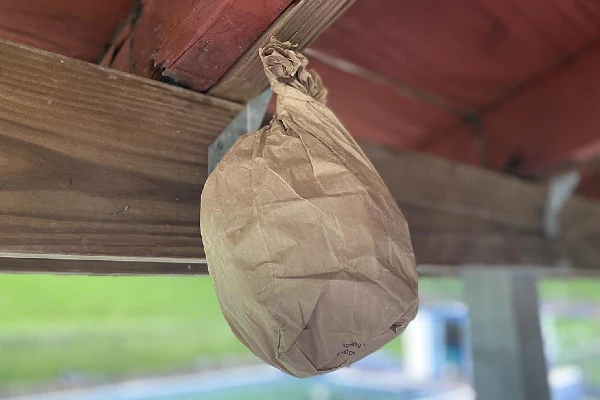
Natural Bee Repellents Checklist
- Essential Oils
- Peppermint oil is a top choice. Its strong scent is disliked by bees. Create an essential oils spray bottle solution for your pool area and patio.
- Other options include clove, thyme, or lemongrass oil.
- Plants
- Bees dislike pungent or strong-smelling plants.
- Peppermint plants, citronella, basil, marigolds, and geraniums are bee-repelling plants.
- Vinegar Spray
- White vinegar, changes the pH balance of an area, which bees avoid. Use a spray bottle with a vinegar and water solution around your pool and outdoor furniture.
- Cucumber Peels
- Surprisingly, bees dislike the scent of cucumbers! Place peels near your pool, on tables, or areas you want bee-free.
- Avoid Temptation
- Use lids on food containers, compost, and trash cans.
- Limit bright colors and floral prints in pool or patio wear.
- Clean up spills of sweet foods or drinks immediately.
- Other Natural Methods
- Dryer sheets: Hang these near the pool – bees dislike the smell.
- Citronella candles: Perfect for evening pool time.
- Brown paper bag decoy: Hang one (like a faux wasp nest) to deter new nests.
Additional Tips
- Hummingbird feeders with sugar water attract bees. Place them well away from your pool.
- Offer alternative water sources like shallow dishes with rocks for bees to safely perch on. Place them away from high-activity areas. This will draw the bees away from your home.
- Inspect for bee nests on tree branches, sheds, or in the ground.
- If you find a bee hive or have a bee problem that persists, consider contacting local beekeepers or a bee removal specialist.
FAQs: Your Bee Repellent Questions Answered
Q: I’m worried about harming bees. Are these natural solutions safe?
A: Absolutely! The great thing about these natural repellents is they deter bees without killing them. Bees play an important role in our ecosystem, and these methods simply encourage them to find food and water elsewhere.
Q: I have a birdbath. How do I keep bees away without harming birds?
A: Offer an alternative! Place a shallow dish filled with water and a few pebbles (so bees have a landing spot) away from the birdbath and your pool area. Refill with fresh water regularly.
Q: My bee problem seems overwhelming. What’s the best thing to do?
A: It’s a good idea to start with the natural methods in this article. If those don’t work, here’s your action plan:
- Inspect: Look for a beehive or a large number of ground bees.
- Identify: Are they honey bees, carpenter bees, or yellow jacket wasps? This helps choose the best approach.
- Call the pros: If needed, contact local beekeepers (they may relocate honey bees) or pest control for safe removal, especially for ground nests or carpenter bee damage.
Q: Do wasp repellents also work on bees?
A: Sometimes, but not always. Yellow jackets are more aggressive than most bee species. Natural options like peppermint oil or vinegar spray are a good place to start for both.
Q: What if I have a lot of flowering plants?
A: This is where specific area repelling comes in! Use cucumber peels, essential oil sprays, or dryer sheets specifically where you want to relax, like around your pool or patio furniture. Bees will still visit your flowers, but are less likely to bother you.
Q: Can I prevent bees from nesting near my home?
A: Yes! Here are some best practices:
- Seal gaps: Check your home’s exterior for cracks or holes bees could use for entry.
- Remove debris: Piles of wood or tall grass provide nesting opportunities.
- Hang a decoy: A brown paper bag resembling a wasp nest can deter new bee colonies.
Q: I’m allergic to bee stings. Is it ever okay to use stronger insect repellents?
A: Your safety is the first priority! It might be necessary to use repellents with active ingredients designed for flying insects, especially if you spend a lot of time outdoors. Always follow product directions and consult your doctor if you have concerns.
Good News: By understanding what attracts bees and using these natural deterrents, you can significantly reduce the number of unwanted bees in your yard – letting you enjoy your outdoor spaces in peace!
When to Seek Professional Help
While many natural solutions and preventive measures can be effective, there are times when professional help is necessary.
Large bee nests, carpenter bees causing damage to your home, or a persistent bee problem despite your best efforts may require the expertise of a bee removal specialist. It’s essential to approach bee nests with caution and keep a safe distance to avoid provoking the bees.
Conclusion
Keeping bees away doesn’t have to involve harsh chemicals or harm these essential pollinators. By adopting natural methods, utilizing preventive measures, and knowing when to seek professional help, you can enjoy your outdoor activities and personal space without the worry of unwanted bee guests.
Remember, it’s about finding a balance that allows us to coexist peacefully with these important creatures, respecting their vital role in our ecosystem while ensuring our safety and comfort.







